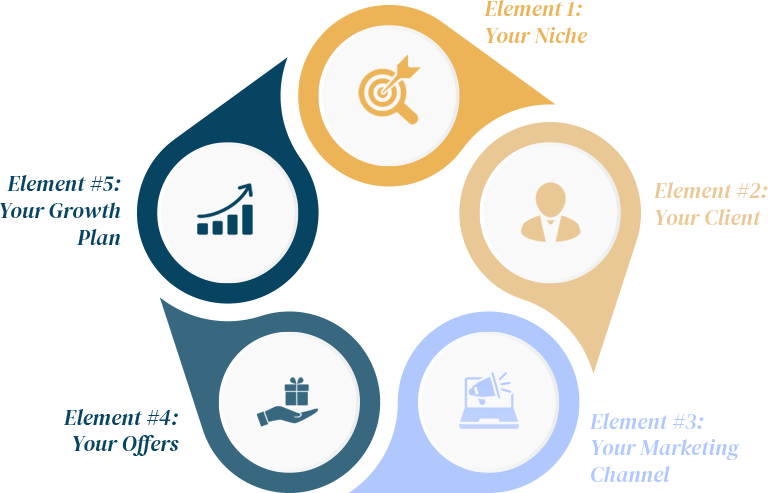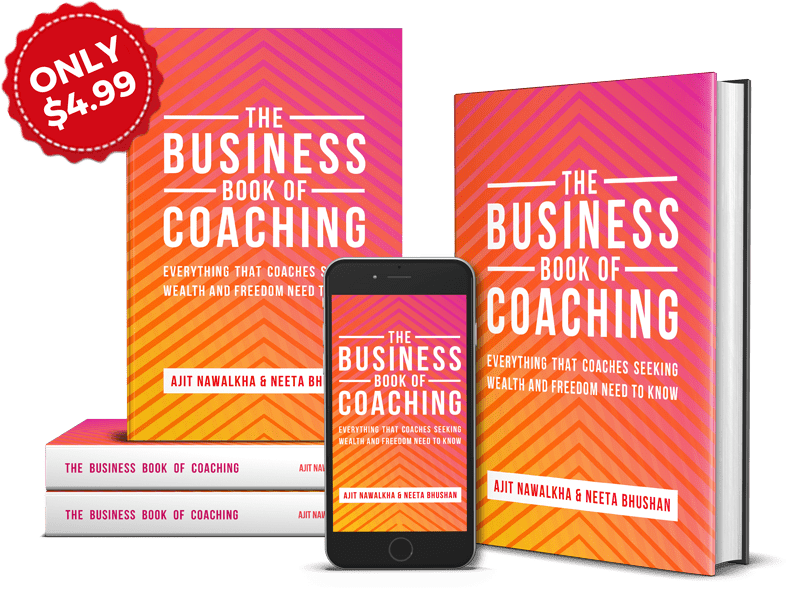The Ultimate Guide to Starting Your Online Coaching Business
How to Build a Successful Online Coaching Business and Create Massive Income and Impact

It’s a fact that there are many ways to coach and create life-changing shifts for clients. But one particular space allows far more flexibility, freedom, and often, more profitability than any other coaching space.
We're talking about the online coaching world.
Now more than ever before, we are connected through online channels. Families use Skype and Facetime to talk to other family members. Teams use Zoom and Google meet to carry out their business meetings. Friends stay in touch through social media.
Especially since the COVID-19 pandemic where all businesses had to turn to digital platforms to survive, we as coaches have needed to adapt as well to continue serving our clients.
Why Online Coaching?
We live in a modern world with every opportunity to offer different learning experiences.
However, after analyzing all the benefits, similarities, and differences between online and offline coaching, online coaching is recommended for its flexibility. Why? Because you can efficiently deliver everything online, manage your students, allocate time, and even host offline classes.
Clients’ needs are very diverse and varied. Some prefer online, others offline. So first, understand who you are addressing. Whether in individual or group sessions, speak with your clients to assess what would be a more efficient learning experience for each and organize your lessons accordingly.
If you prefer offering only online coaching sessions, be clear in your communication with potential clients about it. And you can always add some offline sessions to your package if you’d like a combination of both.
Advantages and Disadvantages of Offline Coaching
Let's go over the benefits of offline coaching.
1. Communication.
Offline coaching sessions make it easy to maintain eye contact, analyze body language, and establish better communication. This will increase your trust in each other.
2. Education experience.
Especially with group sessions, managing the group and ensuring everyone is involved and engaged is more efficient offline.
3. Interactive elements.
Offline coaching also increases opportunities for real-time interaction.
However, do not forget the possible drawbacks:
1. Need to rent a place with proper facilities, so the cost is high.
2. Not time efficient due to travel time, which is important, especially in big cities.
The Main Benefits of Online Coaching
It is time to jump to the incredible opportunities that online coaching provides us.
1. Time-flexibility.
You can schedule the session throughout the day or even late evening whenever you feel most comfortable. Why? Because transportation will not be an issue anymore.
2. Time and budget friendly.
You also save much money by not renting a place or commuting.
3. Technical Skills.
Don't forget to use software programs to make your online coaching sessions more efficient and effective.
Differences Between Online and Offline Coaching
Online learning occurs in a virtual environment or via various video conferencing apps. Whilst Offline coaching occurs in a specific area (room) where the client and coach interact face to face.
So, the main difference is that one is a virtual environment, and the other is in person. However, both are equally efficient (depending on methodology, perceptions, and individual customer needs).
Online coaching requires using the latest technology and specific software and developing technical skills. Offline coaching, on the other hand, only requires the presence of a client and a coach.
Another notable difference between the two is flexibility. Online sessions are more time efficient than offline sessions and can easily be held in the early morning or late into the night.
Online coaching opens up tremendous opportunities to reach a global audience. On the other hand, offline coaching is limited to a specific city or region in your country.
Reflection Time
Which method do you resonate with the most - online or offline coaching? In your journal, write down which and what your ideal coaching packages could look like.
5 Must-Avoid Mistakes in Online Coaching
Before you understand the foundational pillars of starting and growing an online business, let's talk about some of the biggest mistakes that led to broken dreams for way too many coaches...
Even those who are highly experienced "offline" coaches.
So many talented coaches have believed that taking their offline, face-to-face enrollment strategies to a virtual setting will work the same. Still, unfortunately, the online world has its own rules that we need to adjust to.
For example, you can be a master at reading body language and interpreting your client's facial expressions when you are sitting in front of them, but the same won't translate on a webcam or, even worse, on a phone call.
There are five common mistakes coaches make that are basically challenges that arise from miscommunication and misunderstanding around what it actually takes to connect with ideal clients, create consistent income, and build a successful business that continues to grow and thrive over months and years.
Mistake #1:
Not Understanding That It Takes Work
So many people - including coaches - believe that going online means hardly having to do any work.
This belief can be traced back to social media stories about the coveted "freedom lifestyle," stories that usually include images of an entrepreneur sitting at the beach with a laptop and a cool, tropical cocktail in their hand.
While working online does offer a lot of freedom and flexibility, it doesn't mean it's easy.
Like any business, starting an online coaching business needs a lot of commitment, persistence, focus, and attention -- that's a lot of hard work.
The good news is that when you choose to invest time and energy at the start, you'll build a rock-solid reputation that can quickly spread like wildfire. It might sound like a simple mindset shift, but it's a game-changer for creating the online business you dream of!
This makes it much easier to find and enroll clients as you rapidly grow your business.
Mistake #2:
Investing in Expensive Websites, Experienced Team Members, Sales Funnels, Etc.
This is one of those mistakes that have stopped countless amazing coaches from building a business they love.
The truth is going online doesn't have to cost you your life, and you can definitely bootstrap your online coaching business... especially at the beginning.
You basically need a simple, 1-page website you can set up yourself and a safe way for clients to pay you, and you're in business!
As you grow and start to create more income, you can - and should - invest in a small team so you can build out more complex marketing and sales channels to reach a bigger audience of ideal clients.
Learn more about the costs of starting a coaching business and what you should consider investing in.
Mistake #3:
Investing in Expensive Websites, Experienced Team Members, Sales Funnels, Etc.
This one's related to Mistake #2...
While some coaches hold back from spending any money where they end up "freezing" at the starting line...
Others take out loans and "throw cash" at every challenge that they happen to come up against.
Here's the thing...
If you want to make it online, you need to play the long game, and this means making sure you don't run out of money before you have the chance to get your business off the ground.
So, whatever you do, don't go for expensive investments such as a $100,000/year Mastermind Training program when you're barely bringing in $1,000 a month.
Decide to only spend on the things that are vital to keep your business up and running, such as website hosting and a secure online payment platform.
Mistake #4:
Investing in Expensive Websites, Experienced Team Members, Sales Funnels, Etc.
Many great coaches operate on trust alone, which often means they don't have clients sign an agreement or contract.
When you don't have the outline of your work with a client clearly stated in a legal agreement, you're setting yourself up for loss, liability, and damage in terms of reputation and income.
Coaches who don't work without an agreement run the risk of dealing with clients who refuse to pay on time or even at all.
Some coaches have even had clients accuse them of failing to provide a service that was never agreed on in the first place, and it's all because nothing was listed out in legal terms.
So, save yourself all of the heartache and headache, and set aside some of your startup budgets to hire an attorney or lawyer who can help set up your contracts and agreements or hire general insurance for small and medium-sized businesses to stay on the safe side.
If you are just getting started and cannot afford a lawyer or insurance just yet, don't fret! You can use our free coaching agreement template to ensure your terms and conditions are crystal clear with every new client you enroll. It might not be a legal contract, but they will be signing an agreement beforehand, setting the right expectations, and avoiding any misunderstandings throughout the coaching relationship.
Mistake #5:
Investing in Expensive Websites, Experienced Team Members, Sales Funnels, Etc.
Here's another big one.
Many coaches go to family and friends looking for support on what to do next or how to grow their business online.
Sadly, most of the people they talk to are absolutely clueless and unqualified to weigh in and give good advice.
So, make this your personal "alarm bell"...
If you find yourself asking for advice from someone who doesn't already run a successful online business, you're asking for advice from the wrong person!
Mapping Out Your Online Coaching Business
It's rare that a coach can't make it work online because they don't have the right skills.
For the most part, coaches barely make ends meet -- and sometimes they're even forced to quit -- because of bad planning.
This chapter is about mapping out your online coaching business model with a powerful framework that's been proven to create success again and again.
This framework includes key elements that you need to focus on -- your niche, your marketing channels, your clients, your offers, and your growth plan.
Let's define each one and break it down into actionable tasks.


Element #1:
Your Niche
There are riches in the niches.
That's a popular saying in business and it's because it's 100% true.
The online coaching industry is a fantastic space, but it's also a competitive space, and there are countless skilled coaches all over the world who are looking to build a successful online coaching business - just like you.
Identifying your niche is a powerful, effective way to get noticed by ideal clients and to stand out from a crowd of coaches in your space as you build your reputation as an expert rockstar coach.
You need to craft a clear, well-defined niche that you can share on social media, on your website, and at networking events to easily attract the right clients.
A well-defined niche is basically a detailed description of what you actually do in your zone of genius.

Element #2:
Your Client
If you don't know who you want to serve, it's all over before it even begins... and that's not an exaggeration!
The truth is if you're serving everyone in your coaching business, you're serving no one.
People want to work with a coach who is passionate about serving them, whether they happen to be a 40-something executive or a 20-something writer.
If you're confused about who you'd like to serve, give yourself permission to work with a variety of clients for a couple of months until a specific group stands out to you as the clear favorite.

Element #3:
Your Marketing Channel
Marketing is about letting potential clients know that you exist...
It's about letting them know that you're great at what you do and ready to help them get to where they want to go.
The thing about the online coaching world is that there's a massive number of marketing channels you can dive into and a lot of coaches feel they need to work with all of these channels at the same time.
Bad idea.
When you're just starting out, and you don't have a team yet, or you just have one part-time virtual assistant onboard, there's only one thing to do if you don't want to end up burned out and ready to throw in the towel...
Pick just two marketing channels and go all in.
Your core online marketing channel needs to be email, and your second channel can be your favorite social media platforms such as Instagram or Facebook.
The idea is to use social media to give your ideal clients an easy, accessible path to find and follow you, and then have them sign up to join your email list.
Start by creating consistent high-value content for free on the social platform of your choice. Then offer people a freebie, such as a simple PDF or audio or video coaching guide, that includes links for them to subscribe to your email list.

Element #4:
Your Offers
Your offers are how you work with your clients, and there's a world of choices when you go online.
From packages to programs, online coaching can be delivered in many different ways, but one of the most important elements to consider is how you can create coaching packages that can make a tangible difference in your client's life.
So, when you're developing your first coaching package, think about designing something that is enjoyable and gets your clients real-world results.
Coaching is a crowded industry and lots of coaches have amazing coaches packages out there. That's why yours needs to be incredibly transformational to inspire the right clients to sign up.
Creating powerful transformational coaching packages is something you can learn... thousands of coaches have done it, and so can you!

Element #5:
Your Growth Plan
One-on-one coaching can be deeply fulfilling work, but lots of coaches get stuck in the endless "dollars for hours" loop where they work for hours and hours each day -- and on weekends -- just to pay the rent.
If working nonstop doesn't sound like your idea of a good time, and if you want to have a life outside your online coaching business, you'll want to leverage your expertise and create a growth plan where you can offer one to many programs.
One-to-many programs basically mean online group coaching programs, training, workshops, and courses where you create the content and have a lot of people learning from you and working with you at the same time.
This is also great because you can offer the same content and have different people invest in it. That means you create it once, and you get to offer it again and again.
This is the secret behind a highly effective growth plan where you can scale your online coaching business quickly and efficiently.
Create Your Online Business Plan
Let’s put all this information into action.
Element #1: Your Niche
Get clear on your niche with the following questions:
(i) What are some problems that you're great at solving for clients? If you're brand new and you don't have clients yet, think about the kind of problems you'd love to solve.
(ii) What are you passionate about as a coach? E.g., Do you love to coach people about having strong personal boundaries? Do you love coming up with remarkable business strategies?
(iii) What are some of the other coaches working in the area you're interested in? When you look at what other people are doing in your niche, it can inspire ideas and insights around critical aspects of your business, such as how to price your offers and packages, etc.
Element #2: Your Client
There are a ton of "identify your ideal client" exercises online, but many of them take hours to complete. Here's a super simple way to jumpstart the process, and it involves a little bit of visualization. Read the question below, close your eyes and imagine the scene before you write your answer.
When I visualize my perfect coaching session with a client, who do I see sitting in front of me?
Write down everything you saw, and feel free to re-do this exercise as often as you want to get more clarity and details about your ideal client.
Element #3: Your Marketing Channel
We've talked about email as one of 2 key marketing channels you need to have when you're starting and growing your online coaching business.
If you don't already have an email service provider, do some research and look at some of the providers out there (for more on this, check out the next Chapter in this Guide).
Next, think about social media. What's your favorite social media platform? Choose to focus on that and look at how you can build a presence with high-value posts, videos, images, and other content related to your niche.
Element #4: Your Offers
Watch this video on creating powerful long-term coaching packages and start crafting your own:
Element #5: Your Growth Plan
To learn more about scaling your online coaching business with one-to-many programs or training, watch this high-value video.
How to Grow Your Online Coaching Business
The key to growing your online coaching business is to follow a step-by-step process that is easy to replicate. We’ve simplified it into three steps for you.
Step 1 - Who do you want to serve?
First, you need to consider whether you want to be a Generalist or a Specialist. Do you wish to train your clients to improve a specific personality trait, or does your coaching methodology require a more general approach that touches every aspect of their lives?
Now, answer these two questions.
1. What is the number one problem you can solve for others?
Think about your skills, knowledge, and experience.
2. How are you uniquely positioned to solve this problem effectively?
Whose hero do you want to be?
Actual life-changing results create loyal followers. They cling to your every word and sing your praises to whoever will listen.
Now that you know who you want to target as your target audience, the next step is to attract your ideal client.
Step 2 - Marketing Your Coaching Business
There are three main ways to market your coaching business.
1. Pay Per Click Advertising
This includes Facebook Ads, Google AdWords, and LinkedIn Ads. Pay Per Click (PPC) is the fastest way to drive people to your funnel and content. Platforms like Facebook allow you to target your audience members with great precision. Facebook, in particular, makes it easy to connect with your ideal customers through ads based on demographics, interests, and behavior. You should allocate a budget for PPC costs. Remember that testing different ad variations and campaigns is the key to turning your ads into profitable endeavors. Remember that testing different ad variations and campaigns is the key to turning your ads into profitable endeavors.

2. Strategic Partnerships
The key to a profitable partnership is finding someone who offers services and products that complement your proposition.
You are not a competitor, but your target group is the same. They promote your coaching business to your audience and vice versa. It could be through content such as a blog post, video, social media post, or anything. If your content is good enough, people will start sharing it on social media, helping your content go viral.

3. Expert Positioning
The best way to establish yourself as an expert in your field is to create content of great value to your audience. This can be a blog post, video, social media post, or pretty much anything. If your content is good enough, people will start sharing it on social media, helping your content go viral. Put yourself in the audience's mind. Identify your most pressing problems and biggest fears. This allows you to create quality content that potential customers will happily devour and want more of.

And that leads to our third step.
Step 3 - Create an automated sales generation system
The first part of the viewer-to-client funnel is the landing page or lead generation page.
You must create a valuable incentive to get people to subscribe to your service.
These three automated options are easy to keep running once the content is made!
Email Autoresponders and 4-Part Video Series are great because they get you through multiple points quickly and add value. These multiple “touches” are essential to converting someone from an “interested” lead into a drooling buyer. Building relationships and trust with your audience is key.
Selecting an Online Coaching Model That Suits You
If you're trying to figure out how to implement a suitable online coaching model for your business, you're not alone.
There are several ways to integrate online coaching into your business. The following paragraphs detail the most popular and effective online coaching business models.
Let's see if we can find a model that fits your coaching business.
1. The Hybrid Model
The hybrid model is a necessary evolution for brick-and-mortar, traditionally on-site or customer-facing businesses.
In our case, online coaching is added as a supplement to standard services and can be used to engage individuals or groups of clients. Remember what we said about expert positioning in the previous chapter? The hybrid model works best when two or more experts combine services at a physical location.
Why Consider a Hybrid Model?
This is the starting point for most coaching professionals as it can be combined with an existing business and use its facilities in a symbiotic relationship.
2. Fully Remote Program
An online coaching model where sessions, programs, and content are delivered virtually.
Sessions are typically hosted via web conferencing platforms, with content delivered via coaching platforms or email sequences.
This is perfect for solo coaches looking to launch a virtual service that can serve clients regardless of location.
Why Consider a Fully Remote Model?
A fully remote model is the easiest to scale but can be the hardest to launch unless you already have a large enough audience.
There is a multitude of marketing and client acquisition schemes offered to coaches at this point; not only do they need to be good coaches, but they also need to do effective digital marketing to get this model off the ground.
You can provide high-quality service to a small number of customers or a highly scalable service to a larger number of customers by monitoring and evaluating the following factors and how much effort you are willing to put into each one:
Volume of face-to-face interaction
Volume of asynchronous communication
Volume of documentation and administrative work
3. Maintenance Programs
This is a low-cost model with accountability and coaching based on consistent and scalable delivery. After completing a traditional program, you can deliver value to your customers.
Rather than relying on one-to-one sessions, these models are designed for automated digital content delivery via email sequences or learning management systems, scalable webinars, and asynchronous dependent communication.
It relies heavily on human interaction.
This is suitable for almost anyone offering a coaching program.
Why Consider a Maintenance Program?
A lightweight subscription-based program works very well when positioned as a "maintenance plan" that can be moved to after the core program is complete.
This concept is based on several key principles.
Building an audience to sell additional services to in the future.
Balancing value and scalability - otherwise, you’ll waste a lot of time at limited expense.
Here are some trade-offs to consider.
Cool Tools to Grow Your Online Coaching Business
There's no doubt that your coaching skills are the key element to building a world-class reputation and a successful online coaching business, but there's something you need to keep in mind...
You could be the most effective coach in the world, but if your business is disorganized, if your invoices are in disarray, and you can't find the notes from your last client call in the mountain of papers on your desk...
You could end up running your business into the ground.
The good news is there are a TON of foundational tools and systems you can use to run your business smoothly and efficiently.
The even better news? Most of these tools are:
Free or incredibly affordable
Easily available
User-friendly
This means you don't have to invest a large amount of your hard-earned income to get your hands on the right tools, and you definitely don't have to be a tech whiz to work with them.
So, let's look at some of the critical foundational online coaching tools that will save you time, money, and energy so you can focus on doing what you love to do the most –coach!
For Email Lists: Mailchimp
You need an email list of subscribers, and you need a tool to collect, organize and connect with the people who want to hear from you. Mailchimp is one of the most reliable email service providers out there. It's absolutely free for up to 2000 email subscribers, and there are also robust paid versions. This platform does more than just collect email addresses that help you connect with your subscribers. It also provides all the data you need to analyze what's working and what's not in each of your emails.
For instance, you can easily access important information like how many people are opening your emails, how many are reading them, how many are actually clicking on the links, and so on. This is valuable insight to focus on what your audience resonates with most so you can double down your marketing efforts on what works best - fast and effectively!
For Communication: Voxer
Voxer is basically a real-time communication app with a push-to-talk button. In other words, it's like a fun digital walkie-talkie. Lots of coaches count Voxer as their #1 tool for on-the-go coaching. This app is highly versatile and comes with a long list of features, including large group chats for up to 500 people, text, photos, and video sharing, live and recorded voice messages, and a whole lot more. There's a free version and paid versions that offer message recalling options, premium Customer Support, and Dropbox integration.
For File-Sharing: Dropbox
Speaking of Dropbox... this is an amazing tool that offers massive sharing, file transfer, and storage capabilities (storage space starts at 5 Terabytes!) This tool also lets you give file download options to anyone, anywhere in the world, and it's a secure, reliable way to share a PDF, workbook, e-book, audio, or video file with one-on-one coaching clients or students in your group coaching courses and online programs. There are 3 different paid versions to choose from, depending on your needs.
For Notes: Evernote
This is an incredibly useful online "notebook" where you can store notes, and ideas and even record audio messages. You can sync your notes across devices, which means you can access Evernote on your tablet, phone, or laptop. It also comes with a built-in "web clipper" that lets you pull articles and other web-based content from the internet for reference. There's a free version that allows limited storage space and paid versions with a lot more storage plus other extras like the ability to collaborate with team members inside Evernote.
For Payments: PayPal.Me
You might have heard of PayPal as a safe online payment service, but have you heard of PayPal.Me? This is essentially PayPal "light," where you just need to create a free PayPal account and then create a custom link that also works as a direct payment link. Then all you have to do is insert the amount your client needs to pay and send them the link... it works like magic!
For Scheduling Sessions: Calendly
Calendly is a life-saver for most coaches. It's a powerful 24-hour scheduling tool that allows clients to book their coaching calls with you. No more chasing clients, check-ins, and confusion around time zones! All you need to do is mark the coaching slots you'd like to have available each day on Calendly -- for instance; you might be available anytime between 9 am to 2 pm. You can also customize your Calendly to only be available on Tuesdays and Fridays, or you could opt for not having more than 3 bookings per day. You can do all this and more!
Once you create your ideal calendar, you can share your Calendly link on your website or send it directly to your clients or any potential client, so they can book their call based on a suitable time that's available (times are shown based on location, so there's no danger of a mix-up!). There's a great free version you can try and also paid versions if you would like extras like integration with your chosen meeting platform (for example, Zoom)
For Delivering Sessions: Zoom
Talking about Zoom, this platform is a meeting, and video webinar platform, conference room, chat, and phone system rolled into the. It's a great tool for "face-to-face" coaching calls with clients, and it can also support group chats. This extraordinarily versatile platform even gives you a recording option which means you can record your coaching calls and send them along to your clients just in case they want to go over something that you shared in the call.
The best part? You can get a lot of these features absolutely free, or you can choose paid versions that offer even more features, such as a custom meeting ID and branded email meeting invites. There's no time limit if you're on a one-on-one call using the free platform, but if you're planning to have workshops or group coaching calls, we suggest trying the paid version - it won't restrict you to a time limit, and it has great tools for virtual engagement!
For Task Management: Asana
This is a user-friendly project management tool that lets you share and manage all of your projects with team members. Individual and team tasks and timelines are clearly categorized and quick to track within each project. Asana also has a chat function that lets you connect and collaborate with others in real time. This tool is also perfect if it's just for you and you want a reliable and easy-to-use space to organize all your projects. There are free and paid versions available.
Discover more tools for setting up your online coaching business:
start your online coaching business
Now that you know what online coaching is all about, are you ready to launch yours? If that's a YES, we've got the perfect next step for you.
Here's How To Have A Fully Booked Practice, Consistently Grow Your Income And Impact Thousands Of Lives...
...Even If You Know Nothing About Marketing Or Sales.

